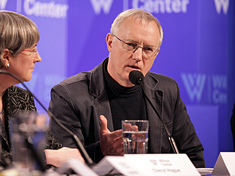-
Nat Geo’s Dennis Dimick on the Food-Water-Energy Nexus, Coal, and the Year Ahead
February 21, 2014 By Paris Achenbach
How clean can coal be? What is the future of food security in water-deprived regions, and how will that affect national security? Dennis Dimick, National Geographic Magazine’s executive editor for the environment, discusses some of the most pressing global environmental problems in this week’s podcast.
How clean can coal be? What is the future of food security in water-deprived regions, and how will that affect national security? Dennis Dimick, National Geographic Magazine’s executive editor for the environment, discusses some of the most pressing global environmental problems in this week’s podcast.
“If you look back to Tunisia, the catalyst for disruption was the price of food,” says Dimick. “In 2008 in Mexico, the riots were over the price of corn. That’s all a direct downstream result of: Was there rain? Could the crops be harvested? Was the harvest that came off the land available and an affordable price?”
The interaction between agriculture and water is a global phenomenon. Maps from the National Oceanic and Atmospheric Administration’s GRACE satellite, show “shocking” soil moisture deficits, he says:
As there’s rising pressure on water supplies, you have competing demands. There’s this energy-food-water nexus that occurs… In Texas, [for example], there’s very little surface water, so you’re mining fossil water that will run out eventually…to get cheap energy. That may help you in the near-term, but you’re setting up the program for essentially desertification and abandonment in future decades.
This food-water-energy nexus is an issue that “needs to be addressed and is not necessarily being included in the narrative right now,” according to Dimick.
Perhaps the biggest issues incarnation of this nexus is the concept of “clean coal.” “It is technologically feasible,” he says of carbon capture but the question is, “is it economically sustainable?” Since the turn of the century, coal has grown faster as a primary energy source for the global economy “than virtually all other energy sources combined.” But coal-burning power plants remain one of the leading contributors of greenhouse gas emissions and are extremely water intensive.
Further, “when you build pipelines, when you build coal plants…you’ve made huge capital investments for decades,” Dimick says. “And that sets an energy path for you…[tying] yourself more to oil or other carbon sources…foreclosing or precluding choices that you might have made otherwise in investing in other kinds of non-carbon emission energy.”
Dennis Dimick spoke at the Wilson Center on January 24 about the biggest environmental headlines in the year ahead at an event co-sponsored by the Society of Environmental Journalists.
Friday podcasts are also available for download on iTunes.
Topics: agriculture, climate change, coal, consumption, development, energy, environment, food security, Friday Podcasts, media, Mexico, natural resources, podcast, security, Tunisia, U.S., water
 A Publication of the Stimson Center.
A Publication of the Stimson Center.




